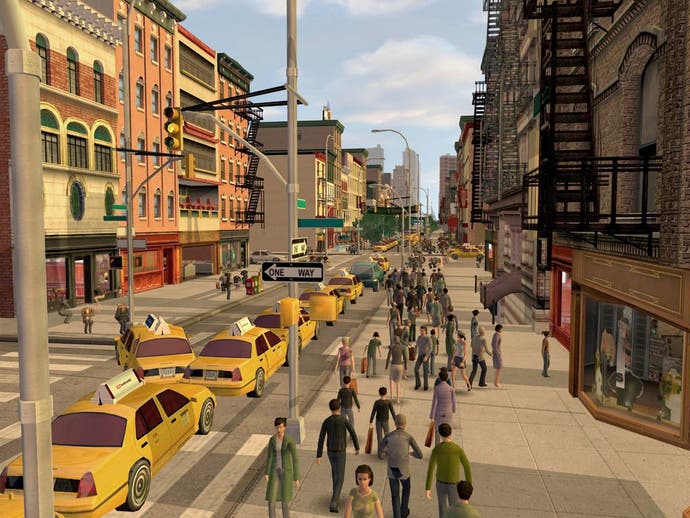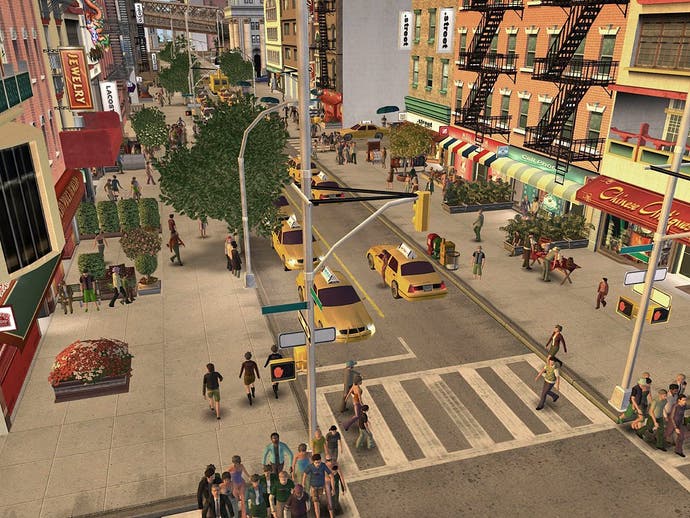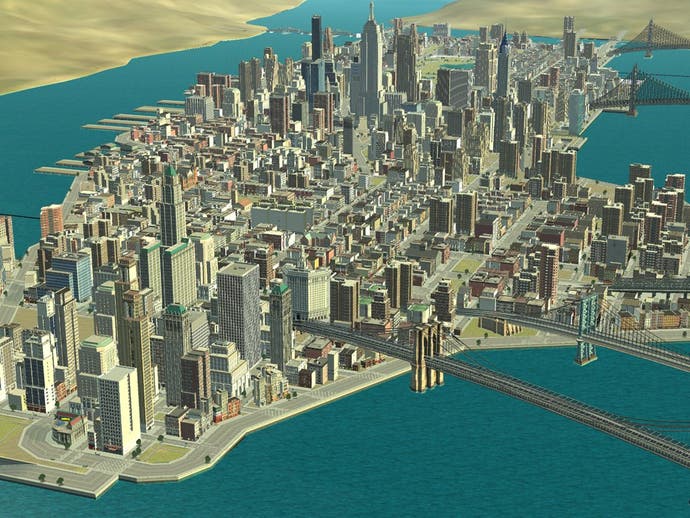Tycoon City: New York
More glamorous (with less plush fittings) than Carpet City: York.
Why does no one ever talk about developer Deep Red's previous city-management game, Monopoly Tycoon? Because - y'know - it was brilliant. Were I Deep Red, I'd be terribly ticked off.
Want a theory? Two problems, and they're both in the name: "Monopoly" and "Tycoon". "Monopoly", while being one of the most famous board games in the world, does carry certain connotations with it. While there's few people who'd find themselves in a games shop who wouldn't immediately nod in recognition, you wouldn't presume that inside the box lay a hard-bitten game of commercial warfare but rather something a little more family friendly. Not that the game was inaccessible in any way, but it had a serious game of financial wrangling with built on a blue-chip design ethos. Secondly, "Tycoon". Since Rollercoaster Tycoon took over the world in the late nineties, the untrademarked and presumably untrademarkable "Tycoon" has been the rogue brand in the gaming world. Anyone with five lines of basic to rub together (10 Print "It is day " + X + " and you have "$ cash. You are very rich. Press a key to continue"; 20 X=X+1; 30 CASH=CASH+RND(3000); 40 Er... whatever command it was to wait for a button press. 50 GOTO 10) can publish a game and call it I Am Very Rich Tycoon. Since anyone can do it, everyone did, so the reputation of games with Tycoon in the title dropped through the floor among the more core gamers. Of course, publishers couldn't stop using them, because a tycoon style game without Tycoon in the title would probably just confuse people.
So, for what seems to be the spiritual sequel, by deciding to lose the licence, Deep Red presumably loses nothing. While they're never going to shake the "Tycoon", at least no-one will think it's a game about Grandma accidentally-on-purpose moving her old metal boot out of jail when no-one's looking. Instead we have a lean game about building a new New York while trying to secure every spare dime from everyone's pockets.
Or so's the theory. And now, with some preview code to hand, it's time to find out what Deep Red have been up to in the last few years, when not making a detour into sin city with their Vega$: Make It Big.

Immediately, it's both familiar and fresh. Tycoon City: New York - like Monopoly Tycoon before it - appears to be an entrepreneur simulator. You study the world to see where there's a gap in the market, then you ruthlessly exploit it. For example, by roaming the map you can see that on a block there's no one selling coffee. In New York? So quickly before Starbucks' enormous space-robot lands at night and constructs eight shops within four square metres, it's time for you to step in. You'll construct a shop, and it'll attract customers from anyone within its radius of influence.
The game's an open strategy game - in that rather than hiding information from you and forcing you to guess, you're given as much as you want. Clicking on a block can bring you up information on whoever's living there and what urges aren't being satisfied sufficiently. This comes especially into play when you're dealing with rival tycoons, each of whom is trying to maximise profit similarly to you. By studying which of their shops are gaining customers from where, you can work out how to trump them, by perhaps opening a competing shop in an intervening area. At the moment, it appears that it's a game of mass population dynamics and the mass-massacres of the free-market.
Of which, much will be familiar to Monopoly Tycoon veterans. Changes are manifold, however. How "mass" the population dynamics are, for example. Following the progression from Monopoly Tycoon to Vega$ to this is one of ever increasing crowd-sizes - and we're increasingly reaching the point where we're actually going to have realistic looking populated metropolises in games.

However, on a more fundamental level, take the improvements to your properties. Each of your shops can be customised to better serve its clientele. Each shop has a number of "upgrade points" available, which limit the amount of improvements you can stick on, and working out how best to arrange these - and what you can afford - gives just the right amount of micromanagement. For the more casual city-builder, it's just a case of deciding what will look best for their New York. For the power-hungry megalomaniac, it's deciding whether pot plants (to increase the beauty), neon flashing signs (to increase the appeal to people) or extra seating (to provide - er - extra seats) is most important for you.
Another important change is that of structure. As well as having the freeform sandbox mode, we have a 'build New York' mode where you move from district to district developing your financial empire. Here, you're given more structure by special objectives you're able to take on. These will take you to a ground level of inhabitants who tell you what their neighbourhood or demographic particularly need, and then allow you to try and satisfy them. Do so, and you earn Landmark bonds.
These are another addition. As well as the sub-quests, these are gathered by levels of in-game competence, and when sufficient have been accumulated allow you to construct the landmarks of each district and reap the benefits of patronising such places. If you want to be the man to build the Empire States Building, you're going to have to work at it. And do remember to install the biplanes to deal with those enormous jealous apes.

Reservations at this stage? Admirably few. Well, the first extra mission you get to take on in the real campaign features a couple of playfully-stereotyped students blithering on about how they want places to get more gnarly T-shirts or whatever in an extended and unskippable manner. If I was interested in anything students had to stay I'd have turned up to some of my lectures in my final year, y'know?
Obviously it's only with deep play that the real worth of a management game comes to light. How strong is the opponent AI? How challenging and interesting is the economic model? Will I be able to produce enough bagel stands and will Seinfield-esque funk-bass guitar appear at point? Such questions are only going to be able to answered when Tom manages to steal proper review code from Atari's headquarters by hacking into their databases. It looks like we're all stuck twiddling our thumbs while his data-worms go to work. Again.

